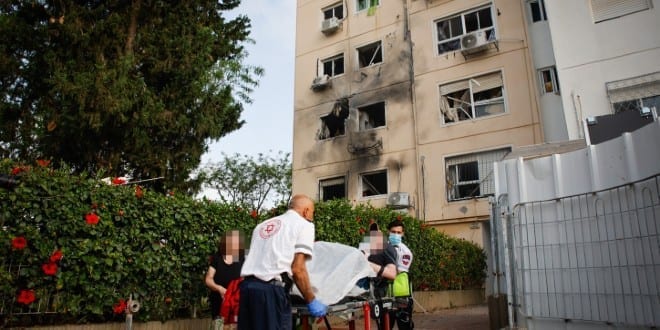The 11-day war of terror from Gaza sent some 4,000 rockets and missiles on half of Israel last May, killing 10 people in Israel and causing physical and psychological damage to many. But residents of the southern part of the country have borne the brunt of such incessant attacks for the last 20 years. How much psychological trauma they have suffered has not been objectively measured until now.
Current diagnostic criteria for posttraumatic stress disorder (PTSD) do not include symptoms resulting from exposure to continuous or ongoing traumatic stress, so existing assessment tools do not fully capture stress symptoms associated with exposure to threats that extend over months or years.
Researchers at Ben-Gurion University (BGU) of the Negev in Beersheba recently developed the first methodology to assess symptoms associated with continuous exposure to traumatic stress from rocket attacks and other security threats that are not currently measured by diagnostic criteria.
Published in the journal Public Library of Science One (PLoS ONE under the title “Development and validation of the Continuous Traumatic Stress Response scale (CTSR) among adults exposed to ongoing security threats, the study identified three distinct factors – exhaustion/detachment, rage/betrayal and fear/helplessness. “Exposure to ongoing life risk exists wherever people experience continuous terror, rampant crime and civil war,” noted lead researcher Dr. Aviva Goral, a graduate of the School of Public Health in BGU’s Faculty of Health Sciences, and a researcher at the PREPARED Center for Emergency Response Research (PREPARED).
“Current scales assess the more commonly known effects of exposure to traumatic stress, mainly post-traumatic stress disorder (PTSD). This limits patient assessment and may lead to misdiagnoses and ineffective treatment,” she explained. “The research was conducted to address this gap by developing a validated, comprehensive assessment tool, the Continuous Traumatic Stress Response (CTSR) Scale.”
In the study, researchers sampled 313 adults who were or were not exposed to ongoing security threats between December 2016 and February 2017. Exposed respondents lived in communities bordering the Gaza Strip in southern Israel, where frequent rocket attacks require them to find shelter within 30 seconds or less. Researchers compared the concurrent validity of CTSR relative to the Post-traumatic Diagnostic Scale (PDS).
The findings showed that the CTSR measures a concept related to – but distinct from – PTSD; responses to ongoing exposure to threat are wider and more intensive than those associated with single traumatic exposure and may include cognitive, behavioral and emotional effects that are not part of traditional PTSD criteria.
Among CTSR criteria, a reduced sense of safety, distrust and mental exhaustion emerged with ongoing exposure to stressors. Other items including social withdrawal, feelings of emptiness, hopelessness, estrangement and feelings of constantly being threatened are also symptoms of ongoing exposure to trauma.
“These findings imply that it is not exposure to ongoing threats per se, but rather the level of perceived threat (such as the likelihood of injury or harm) that accounts for the difference in the prevalence and severity of CTSR stress symptoms,” said Goral.
“Compared with distant communities, communities adjacent to the border are much more vulnerable to rockets and tunnel infiltration, creating an atmosphere of tension and fear,” commented says Prof. Limor Aharonson-Daniel, head of PREPARED and Goral’s Ph.D. supervisor.
“Now, further studies are being conducted with larger samples and in broader populations around the Gaza envelope. Future research will include international implementation in various languages and with other populations exposed to ongoing conflict or persistent civil war such as Syria. This cross-cultural research will help identify the similarities and differences between conflict zones and cultures and facilitate the generalization of the CTSR scale,” she concluded.



